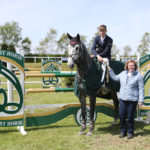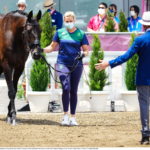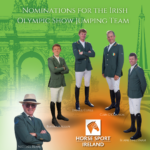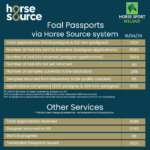FEI – conference delegates give positive response to Endurance strategic plan
- 9 February 2014, 09:19
DELEGATES from 23 countries reached a broad consensus on the strategic plan for Endurance sport at the one-day Endurance conference in Lausanne (SUI) today.
The conference was attended by more 70 delegates, with a total of 20 National Federations represented. Other bodies attending the conference were the European Equestrian Federation, World Horse Welfare, American Endurance Ride Conference and the Equine Community Integrity Unit (ECIU), as well as members of the media. FEI President HRH Princess Haya attended as an observer, along with members of the FEI Executive Board.
The morning session focused on feedback from the National Federations on the proposals outlined at the 2013 General Assembly in November 2013 by the Endurance Strategic Planning Group (ESPG).
Of the 47 National Federations involved in the sport, of which 33 run elite Endurance events, 20 Federations returned responses via the electronic survey, a further six sent additional comments. A team of veterinary surgeons also held its own scientifically based review and shared its views with the ESPG.
ESPG Chair Andrew Finding summarised the results from the survey, in which 32 of the Group’s 37 recommendations received an approval rating of over 80%.
“The consultation was never intended to be a referendum, it was designed to add value to the work we have been doing and vitally to give every National Federation an opportunity to comment,” he said. “Some decided to comment, many did not but every National Federation had an opportunity to do so.”
Andrew Finding pledged that every comment received would be addressed by the Group and, where appropriate, covered at the operational planning level. He also stated that the Group had recommended that members of the Endurance Committee should be tasked with a specific area of responsibility to cover each of the critical success factors outlined by the ESPG – culture and behaviour; structure and governance; foundation for growth, and communications and marketing.
His presentation then focused on the five recommendations that had a lower approval rating, but still in excess of 50%. These were the designation of Persons Responsible, and whether trainers should be included alongside riders, ride qualification standards, a trainers ranking list, awards for completions, and awards for officials. He also covered five other areas that National Federations had raised in their responses to the survey and which the ESPG felt had not been covered fully in its recommendations.
Debate during the day focused on the key areas of horse welfare; clean sport and the rules, which were widely accepted as fit for purpose; support for officials on enforcement of those rules; transparent and consistent reporting; the use of technology; rider competence and horsemanship; cost implications; sponsorship; the technicality of courses to help resolve speed-related issues; technical criteria during competitions; individual and team performance; and ensuring the long-term development of the sport.
There was also considerable discussion on the traditional Endurance rides, which are now being referred to as Classic Endurance riding, and Endurance Racing. There were mixed views on whether a different set of rules should be used, but it was generally agreed that the rules cover both elements.
Part of the afternoon’s session was devoted to establishing the Key Performance Indicators (KPIs), which will be used to evaluate the success of the strategic plan.
During his summing up of the day’s proceedings, moderator John McEwen thanked Andrew Finding and the ESPG members for all their work. “This conference was to complete the work of the ESPG,” he said. “I want to thank them all individually and personally and Andrew for leading them.”
“Endurance sport has expanded thanks to the expansion in Group VII; we mustn’t lose sight of that expansion,” he continued. “How we handle the expansion of the sport is down to you and it’s important we handle that right for the future of the sport.
“You’ve all said that actually the structure and governance is in place. Yes we need to implement it in slightly different ways in certain aspects. We have the guidelines from the ESPG, which are extremely helpful in helping us to do that. I think the feeling in general is that we want this to remain one sport. I am passionate about this and I believe that we need to stay as one sport and that is only possible if people are open-minded and have wide vision.”
The ESPG will now use the input from today’s conference to finalise its report, which will be presented to the FEI Bureau for further consideration. The FEI Bureau and the Endurance Committee will report at a special session on Endurance at the FEI Sports Forum (28-29 April 2014) about the follow-up on the conclusions of the ESPG.
The 20 National Federations represented at today’s conference were from Belgium, Botswana, Czechoslovakia, Denmark, France, Germany, Great Britain, India, Ireland, Italy, Namibia, Netherlands, Norway, Portugal, South Africa, Spain, Sweden, Switzerland, Slovakia, United States of America.
The FEI Endurance Strategic Planning Group (ESPG), set up last year following the Endurance round table on 24 July, was tasked with creating a long-term plan for the discipline to tackle the issues currently being faced in Endurance. The ESPG is chaired by Andrew Finding, European Equestrian Federation Board Member and CEO of the British Equestrian Federation.
The members of the Group are veterinarian Brian Sheahan (AUS), chair of the FEI Endurance Committee; Joe Mattingley (USA), international Endurance rider; Saeed H Al Tayer (UAE), Vice President of the Dubai Equestrian Club and organiser of FEI World Endurance Championships; and veterinarian Jean-Louis Leclerc (FRA), an internationally respected and very successful chef d’équipe and team manager within the discipline.
- Popular

- Latest

Wormers aren’t the answer to worms – Equine Parasitology Webinar
Horse Sport Ireland Podcast – Youth Show Jumping: Pathway to the Podium
Irish Sport Horses get 38 podium places in the 40 classes this week




























